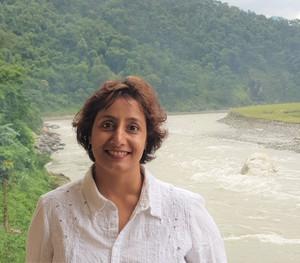Online training workshop - Women entrepreneurship in natural resource management: Challenges and opportunities for the micro-, small, and medium enterprises (MSME) sector in the post-COVID-19 socio-economic recovery
Micro-, small-, and medium-sized enterprises (MSMEs) fill crucial roles in economies all over the world. MSMEs can often innovate, pivot, and generally navigate the global economic waters more quickly than their large counterparts. Globally, MSMEs account for 90% of business enterprises; micro- and small enterprises together account for a staggering 70% of employment worldwide. The MSME sector generates approximately 40% of GDP in developing economies; in developed economies, 7 out of 10 jobs are created by MSMEs.
While opportunities exist for women entrepreneurs in all sectors of the economy, there are a few that can be considered as particularly well suited for MSMEs. These sectors include services, the circular economy, information technology, and natural resources management. Each of them has at least one of the following characteristics: relatively low capital requirements, reliance on technological advancements such as machine learning and big data, and the need to adapt to quickly changing circumstances.
The COVID-19 pandemic simultaneously presents unprecedented challenges and unique opportunities to women-led MSMEs. MSMEs in general, and women-led MSMEs in particular, have been especially vulnerable to the impacts of the COVID-19 crisis. However, the crisis has also caused a dramatic shift in the business-as-usual approach, and paved the way for innovations, green growth, and sustainable development. Women-led MSMEs may be best equipped to take advantage of these opportunities.
This training workshop will focus on the challenges and opportunities in the sustainable natural resources management sector, which is uniquely suited for MSMEs and presents appealing, diverse, and long-term impactful opportunities for women.
Press Release: UNECE suggests policy initiatives to foster Women Entrepreneurship in Natural Resource Management
Presentation: Women entrepreneurship in natural resource management
Workshop Report: Read here
Recording:
Resource person
Ms. Kankana Dubey, UNECE Consultant

Kankana Dubey is a UNECE consultant and author of the report Women entrepreneurship in natural resource management: Challenges and opportunities for the micro-, small, and medium enterprises sector in the post-COVID-19 socio-economic recovery. She holds a Master of Science degree in Energy Management from the University of Stirling. She is currently pursuing her doctoral studies in Politics at the School of Government & Public Policy at the University of Strathclyde. Kankana is an active member of the UNECE Group of Experts on Energy Efficiency and its Joint Task Force on Energy Efficiency Standards in Buildings. She co-authored the 2019 UNECE report Mapping of Existing Technologies to Enhance Energy Efficiency in Buildings in the UNECE Region.
Kankana is an experienced researcher and has previously worked at the King Abdullah Petroleum Studies and Research Center (KAPSARC), an international energy research think tank. At KAPSARC, her research covered a wide variety of topics at the intersection of economics, energy, and politics. Kankana has authored several articles, policy briefs, and book chapters and presented her work at numerous international forums on energy, economic diversification, energy productivity, and socio-economic wellbeing. Kankana has extensive professional energy-sector experience in business development, renewable energy consulting, energy efficiency, and sustainability.


